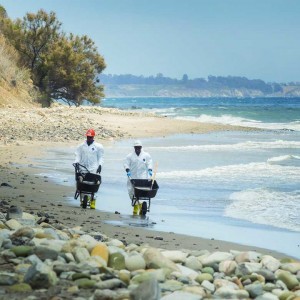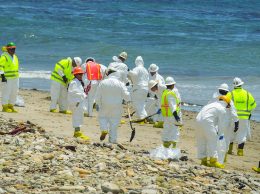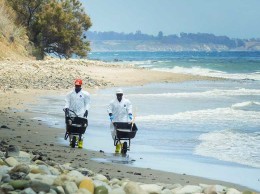Fines, cleanup costs climbing for owner of oil pipe that leaked
IN THIS ARTICLE
- Energy Topic
- Marissa Wenzke Author
By Marissa Wenzke Friday, May 29th, 2015
The pipeline leak that released more than 21,000 gallons of oil into the ocean and soiled 9 miles of Santa Barbara coastline on May 19 will likely result in a $200,000 fine from federal regulators and potentially millions of dollars in cleanup costs and environmental penalties for the pipeline’s operator, Houston-based Plains Pipeline.
An investigation into the exact cause of the spill is ongoing but officials have pointed to a ruptured pipeline that was not equipped with an automatic shut-off valve like all other oil pipelines in Santa Barbara County.
Plains was cited for 10 crude oil spills around the country between June 2004 and September 2007 alone, for which it ultimately paid a $3.25 million civil penalty, in addition to 175 pipeline safety and maintenance citations from the federal Pipeline and Hazardous Material Safety Administration since 2006. The company was responsible for an 18,000-gallon spill in Los Angeles around this same time last year.
A subsidiary of Plains All American Pipeline, Plains Pipeline was shut down by the PHMSA within days of the incident. The federal agency issued a corrective action order requiring Plains to suspend operations and make safety improvements on Line 901, the 24-inch, 10.6-mile pipeline that was ruptured, in addition to cleaning up the site and submitting a plan to PHMSA before operations can resume.
Adding up the penalties
The total damages inflicted on wildlife, property and otherwise have yet to be calculated as the area continues to recover. However, experts say the company can expect to face violation penalties related to a host of environmental laws, along with cleanup costs. For one, the default penalty given by PHMSA amounts to $200,00 per day per violation — not including cleanup days — and there’s a $2 million maximum on how much a company can be fined for a related series of spills.
Since the spill lasted less than 24 hours, Plains can probably expect the standard $200,000 daily fine from PHMSA, but other costs and penalties related to other laws will probably be much harsher.
All costs associated with the spill are to be coordinated and decided by a single official called a lead administrative trustee, according to Scott Slater, an attorney at Brownstein Hyatt Farber Schreck who specializes in environmental law and policy.
This federal official is in charge of coordinating activities and fines related to the spill, in accordance with the Oil Pollution Act of 1990. The legislation was passed in 1990 to “create a strategy for dealing with the problem,” Slater said, as it was enacted just a year after the catastrophic Exxon Valdez spill.
At the time of its passage, the Oil Pollution Act amended the Clean Water Act to increase fines and penalties for oil spills that enter open waters. With inflation accounted for, the current rate for civil penalties under the act is $32,500 per day, or $1,100 per barrel or unit. In the case of gross negligence or willfulness, the rate would increase to $4,300 per barrel — the rate used in penalizing London-based British Petroleum for the 2010 Deepwater Horizon spill that unleashed 4.9 million barrels into the Gulf of Mexico and killed 11 people.
The Refugio oil spill released about 2,400 barrels of oil, with about 21,000 gallons of it spilling into the ocean. Given the Clean Water Act fines only apply to oil released into bodies of water, the fine would amount to about $550,000 at the very least and up to about $2.1 million in the case of gross negligence. However, these fines do not include cleanup costs.
Paying up for cleanup
Under the Oil Pollution Act, the lead administrative trustee overseeing the spill would determine cleanup costs by looking at three main factors — the cost of restoring, rehabilitating, replacing or acquiring an equivalent of natural resources damages; costs associated with the amount of time it takes to clean and recover the area; and costs of paying those engaging in restoration efforts.
“Tourist destinations or sensitive habitats, such as coral reefs, will likely require more stringent cleanup standards, thus increasing the costs. The political and social culture at the spill site plays a part as well,” environmental specialist Jonathan L. Ramseur wrote in a 2012 report on coastal oil spills.
However, these costs do not include potential private lawsuits or state actions or penalties, and it has yet to be determined if criminal charges will be levied. The state Attorney General’s Office has launched its own investigation.
Looking at the cause
While the cause of the incident has been said to be the lack of an automatic shut-off valve, some industry insiders say such valves are not always used. The decision of whether or not to use an emergency valve is dependent upon factors such as carrying capacity, topography of the surrounding area and amount of pressure within the pipeline, according to John Stoody, vice president of government and public relations for the Association of Oil Pipe Lines.
“We haven’t yet heard the cause of the incident, so we’re only speculating whether an emergency shut-off valve would’ve made a difference,” Stoody said, adding that the lack of Santa Barbara County oversight over the pipeline is not uncommon or surprising.
Since the ruptured pipeline was interstate, Stoody said the responsibility for overseeing it is primarily in the hands of federal agencies.
But local oversight was not always missing for the oil pipeline off of Refugio State Beach. The pipeline operator — then called All American Pipeline — filed a suit more than two decades ago asking for federal oversight rather than any involvement on behalf of Santa Barbara County. An official with PHMSA said the federal agency’s oversight is usually less stringent than state safety programs.
While investigations into the spill are ongoing, one thing is certain. The parent company for Plains — Plains All American Pipeline — has a $75 million budget allocated just for “environmental liabilities” as recently as March 31, according to the company’s SEC filings.
A number of area and state policymakers — the only individuals who possess the power to increase or lower penalty rates through legislation — have come forward with calls to end offshore oil drilling and transition to clean energy sources. In a statement, state Sen. Mike McGuire, D-Healdsburg, called the May 19 spill “yet another example of the significant dangers related to coastal oil development” while Congresswoman Lois Capps, D-Santa Barbara, has stayed set on transitioning away from fossil fuels entirely.
“The truth is there is no penalty high enough that can guarantee a completely safe way to extract and transport oil and prevent future spills. Therefore, we must transition away from fossil fuels,” Capps’ legislative assistant, C.J. Young, said in an email.











